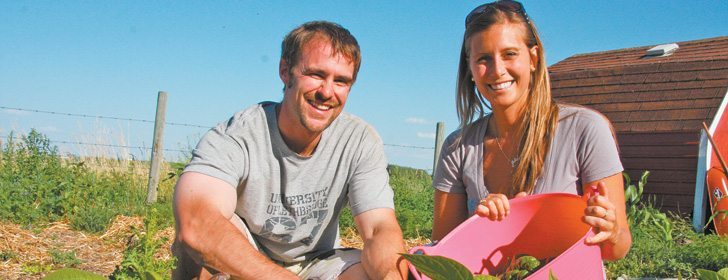Permaculture concept | Couple makes the most of the land while protecting the environment for future generations
A lush, green front lawn is a waste of potential.
That’s how Julia Mitchell and Jason Baranec see it.
The rural Lethbridge couple has embraced permaculture, which works with nature to create sustainable habitat and grow food.
For these self-described “permies,” the front lawn is a common example of how people have separated themselves from food production, often to the detriment of health, the environment and natural food production systems.
“We bash the front lawn quite a bit, in more of a joking way, but it sort of represents all that’s wrong with current society,” said Mitchell.
Read Also

Huge Black Sea flax crop to provide stiff competition
Russia and Kazakhstan harvested huge flax crops and will be providing stiff competition in China and the EU.
“We joke that the front lawn is kind of useless. It does look good and there are values to it … but we sort of view that as, instead of using your front lawn to just be front lawn and look the same or more green than your neighbours’, we see it as an opportunity for growing your own food.”
They took several courses in permaculture concepts and have put their beliefs into practice.
Though they both work day jobs in Lethbridge, they’ve employed key concepts of the philosophy on their acreage near Park Lake: recycling, self-sufficiency, frugality, following nature’s lead in food production, learning from others and making food easily accessible.
Their accomplishments are many:
- They built a greenhouse that has recycled patio stones for a floor, uses rain barrels and runoff from the house for watering and has a passive solar exposure near the house.
- They planted a vegetable garden using companion planting and keyhole patterns to minimize water use and simplify access to produce.
- They compost yard and garden waste for reuse as fertilizer.
- They maintain a flock of 35 chickens for eggs and meat.
- They built an outdoor clay oven using recycled brick, soil and straw from their own property.
And they consider it a beginning.
“The reason why I was so intrigued by (permaculture) is the local food growth aspect of it,” said Mitchell, originally from Toronto.
“We both really think it’s important that people need to start considering where they get their food from, how it arrives to them, what’s in it. The general food industry has sort of spiraled out of control in terms of its environmental footprint.”
Baranec, who grew up on a farm near Bentley, Alta., and is the project manager at the University of Leth-bridge, said he is often asked to define permaculture.
“I think a good elevator speech that we stumbled upon is, if the rain barrel or the solar panel or the garden were all tools, permaculture would be the toolbox that organizes it,” he said.
He sees many farming applications within permaculture concepts, among them rotational grazing, holistic animal management, cover cropping, mulching and erosion prevention.
The couple teaches permaculture workshops, and this summer they organized a blitz that transformed an urban yard into a food producing patch of land.
The community aspects of permaculture, as well as its informality, are major appeals for them.
“It’s an organic structure,” Baranec said. “It’s a network of people trying to improve on one another’s ideas.”
Mitchell likens it to open-source software, free to all who want to learn about producing their own food and are willing to experiment.
Two Australians, Bill Mollison and David Holmgren, founded the permaculture design system in the early 1970s. Permaculture groups have since formed in several countries, including Canada, which has its own permaculture institute in Ontario.
“It’s a pretty easy sell when people start describing to you how you can design your systems for as little work as possible and as much output, which is always a big deal to everyone, especially to farmers,” Baranec said.
Beyond that, Mitchell said it’s a way of looking at living life and creating a culture that will protect the Earth for future generations. Permaculture is a derivative of permanent agriculture but also permanent culture.
“That permanence also implies making the world better for future generations, so ensuring that in your great life you … ensure that your kids and their kids and their kids’ kids are going to have the same benefits that you did and better.”
And what about that front lawn? Will it look as pretty if it becomes a garden or a compost pile? It depends on your definition of pretty.
“I think a productive resource can be just as aesthetically pleasing as a non-productive resource,” said Baranec, as Mitchell nodded agreement.


















